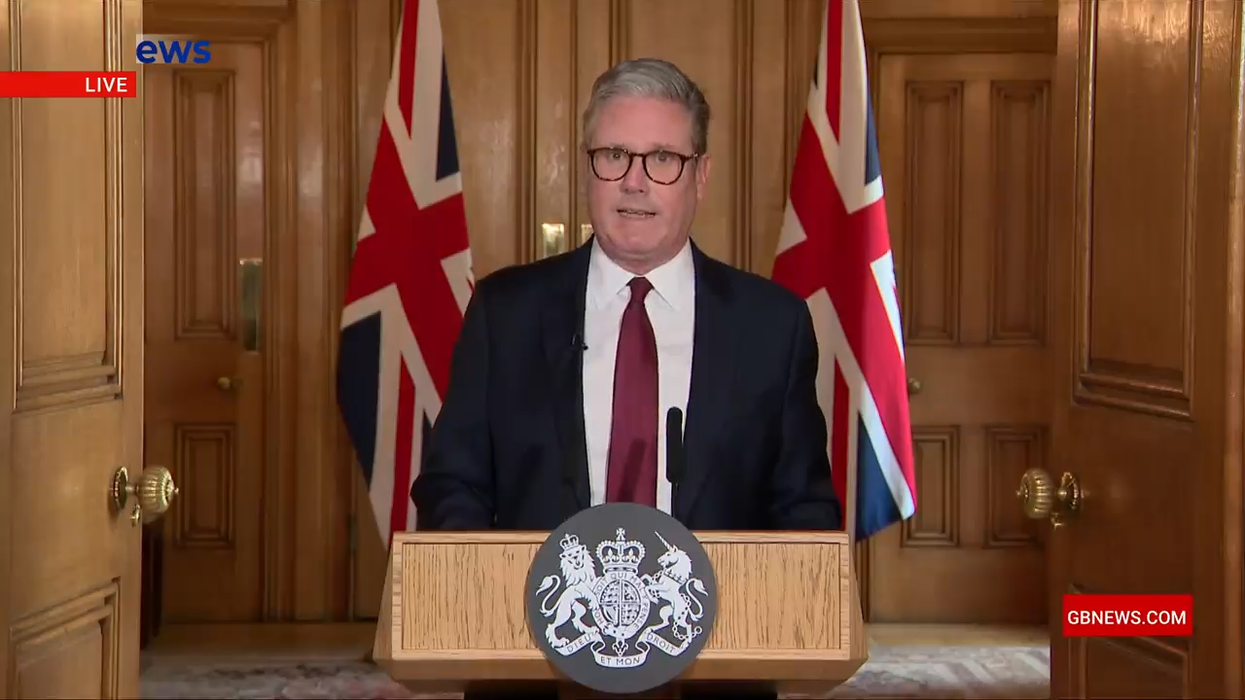Labour's tax raid EXPOSED: Keir Starmer is about to tell Britain 'things will get worse' just two months after promising it will get better

Keir Starmer will say Britain is set for worse times before better
| GB NEWS
Keir Starmer previously promised the country 'things will get better' under Labour
Don't Miss
Most Read
Before the General Election, Keir Starmer told the British people that things would get better - that he would bring wealth back to the country - now just two months in the Prime Minister is about to embark on his first broken promise.
In his Election pledges, the then Labour leader spoke of how a big majority would be 'better for the country.'
He said a strong mandate would give people 'more money in their pockets.'
Labour's vision headed up by Starmer, Reeves and Rayner focused on promises of creating growth for Britain and the British people.
"The most important thing is growing the economy and wealth creation. I do think that's been the Achilles' heel for 13 years now," he said.
"You can talk about public services but if you haven't got your economy working then you can't do that. If you haven't settled the planning, the infrastructure challenges, then you can't get your economy going."
Now Starmer will claim in a speech on Tuesday how things will get worse under Labour before they get better - in a 'jam tomorrow' promise.
He will warn 'working people' that he must take 'unpopular decisions' in his speech.
He is laying the groundwork - as many will see it - for sweeping tax rises on working people.
He will say: "When there is rot deep in the heart of a structure, you can’t just cover it up. You can’t tinker with it or rely on quick fixes. You have to overhaul the entire thing. Tackle it at the root. Even if it’s harder work and takes more time.”
“Because otherwise what happens? The rot returns. In all the same places. And it spreads. Worse than before. You know that – and I know that. That’s why this project has always been about fixing the foundations of this country."
The Prime Minister has repeatedly promised he will not raise taxes for workers but he has failed to rule out other taxes such as Capital Gains Tax and Inheritance Tax - as well as raids on businesses.
Meanwhile Keir Starmer has defended his decision to give public sector workers payrises - a move which is playing into his union paymasters.
We look at the potential tax rises Starmer could be planning...
Income Tax Increases
One potential tax rise under Keir Starmer’s Labour government could involve increasing income tax rates, particularly for higher earners.
Starmer may choose to raise the top rates of tax, currently set at 40% for incomes above £50,270 and 45% for incomes over £125,140, as a means of addressing public spending deficits. While the goal would be to target wealthier individuals, changes to tax thresholds could bring middle-income earners into higher tax brackets, impacting a larger portion of the workforce.
This measure might prove politically challenging, as Starmer would need to balance calls for wealth redistribution with ensuring that tax burdens do not excessively dampen the disposable income of average workers.
A rise in income tax could be framed as necessary for funding critical public services like the NHS and social care, but it would require careful handling to avoid alienating middle-class voters already struggling with cost-of-living pressures.
National Insurance Contributions
Another potential avenue for tax increases is National Insurance (NI) contributions. NI is a tax paid by both employees and employers, with the primary purpose of funding social security benefits, such as state pensions and healthcare.
Raising NI rates would directly reduce the take-home pay of workers while increasing costs for businesses. Starmer may consider this route to raise significant revenues, but it could disproportionately impact lower- and middle-income earners.
Such a move may also affect the self-employed, who already face a distinct set of NI rates. While Labour might argue that higher NI contributions are necessary to restore public finances after years of Conservative-led austerity, this policy could prove unpopular if it erodes workers' earnings and places additional pressure on businesses already facing economic headwinds.
Capital Gains Tax and Wealth Taxes
Starmer could also consider reforming capital gains tax (CGT) or introducing a wealth tax as a way to raise revenue without directly increasing income tax. Capital gains tax is currently applied to profits from the sale of assets, such as property or stocks, with rates lower than income tax.
By aligning CGT rates more closely with income tax, Starmer could ensure that those who profit from investments pay a more equitable share. Additionally, a wealth tax targeting high-net-worth individuals could serve as a means of redistributing wealth without burdening the general workforce.
However, such policies could still affect middle-class individuals who rely on property sales or investments for retirement. While appealing to Labour’s progressive base, these taxes would need to be carefully designed to avoid discouraging investment and potentially harming economic growth.
VAT Increases
Labour could also look to indirect taxation, such as increasing Value-Added Tax (VAT), to raise funds. VAT is a consumption tax placed on goods and services, currently set at 20%.
An increase in VAT would generate significant revenue but could disproportionately impact lower-income households, who spend a larger share of their income on everyday necessities. Although Starmer might prefer indirect taxation as a way to avoid increasing direct income taxes, raising VAT could stoke public discontent, especially during a cost-of-living crisis.
Starmer’s challenge would be to balance the need for new revenue streams with the regressive nature of VAT, which tends to hit the poorest hardest, potentially undermining his party’s pledge to reduce inequality.
Inheritance Tax Reforms
Inheritance tax (IHT) is another area Keir Starmer's Labour government may explore for potential reform. Currently, inheritance tax is levied at 40% on estates valued above £325,000, with allowances for spouses and additional exemptions for main residences.
Starmer could consider lowering the thresholds or increasing the tax rate, particularly for the wealthiest estates, as a means of addressing wealth inequality. Advocates for reform argue that inheritance tax helps redistribute wealth concentrated in the hands of the wealthy and ensures that future generations benefit more equally.
However, any changes to IHT could spark backlash, particularly from middle-class families who have accumulated wealth through property ownership.
While an increase in IHT could be presented as a way to tackle inequality, Starmer would need to carefully navigate public opinion, as many view inheritance tax as a “death tax,” and changes could affect a larger portion of the population, especially in areas where property prices have skyrocketed over the past few decades.










